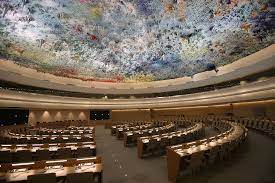
An international symposium held this Wednesday at the United Nations Human Rights Council in Geneva, on the sidelines of the 41st session of the Universal Periodic Review mechanism has decried the dire situation prevailing in the Polisario-controlled Tindouf camps, in Algeria, as abnormal.
Addressing the symposium, Dutch expert Hans Noot, decried the abnormal situation in the Tindouf camps and the gap recorded in relation to the standards of the 1951 Geneva Convention on Refugees, a situation, he said, that deviates from the rules of international law.
The Tindouf camps represent an exception in which the population is deprived of censuses, protection reports and refugee cards, the Dutch expert in organizational behavior and organizational anthropology and member of the board of Human Rights without Borders in Brussels said.
The camps’ population is victim of serious human rights violations, some of which amount to war crimes, far from the eyes and international vigilance and this by giving, on the part of the host country, the full mandate to an armed group to manage the camps and provide immunity, he deplored.
The symposium that was moderated by Swedish political advisor and expert in African affairs, Björn Holtin, was also an opportunity for Hans Noot to address the issue of large-scale embezzlement of humanitarian aid, which has been exposed by the European Anti-Fraud Office “OLAF”, several NGOs and numerous UN reports. He explained the extent to which this looting has affected the living conditions of the camps’ residents, previously severely affected by the void left by the host country’s failure to meet its commitments to connect the camps to basic services, posing another challenge to the access of economic and social rights within the camps.
The moderator of the symposium Björn Holtin pointed out that Algeria represents a model that has shirked its duties and obligations, due to numerous pending cases and unanswered special procedures correspondences, as well as suspended or obstructed international visits.
Another participants, Oualid Kebir, an Algerian political and human rights activist and president of the Maghreb Association for Peace, Cooperation and Development, addressed the challenges posed to the right to freedom of opinion and expression in Algeria, describing the current situation as dangerous.
He denounced the abusive arrest of demonstrators and activists of the movement, as well as the alarming resurgence of violations in the public and civil space in Algeria, explaining that the Algerian military regime added several amendments to the laws to legitimize abuses against human rights defenders, activists and journalists.
The Algerian regime has gone further, as Oualid Kebir asserts, by expanding the definition of the crime of terrorism, regardless of the state’s obligations under international law, to harass human rights activists and bloggers and prosecute them on various charges such as incitement to assembly, intelligence with a foreign country, or contempt of state institutions.
The symposium was organized by the International Observatory IOPDHR- GENEVA, in partnership with the international PDES-NGO (Promotion of Economic and Social Development) having a consultative status at the UNHRC, which presented the results of their joint report regarding the degree of compliance by the Algerian state with its international obligations under the Universal Periodic Review – the fourth cycle – in light of the recommendations made in May 2017.
